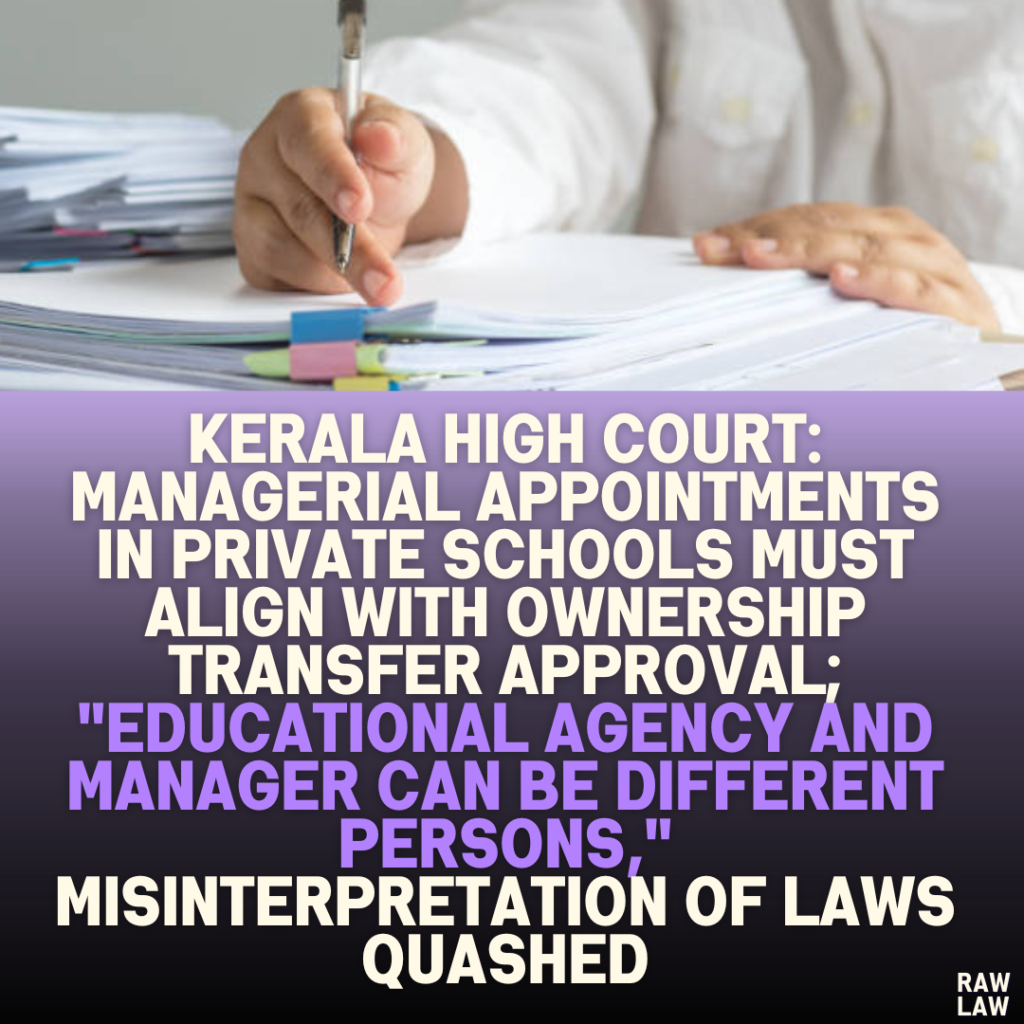Court’s Decision:
The Kerala High Court set aside the impugned orders rejecting the appointment of the second petitioner as the Manager of a Lower Primary School. It ruled that the reasoning behind these rejections was based on misinterpretations of the relevant laws, specifically the Kerala Education Rules (KER) and the Kerala Education Act, 1958. The court clarified that the Rules allow the educational agency (owner) and the Manager to be different entities and directed authorities to act accordingly.
Facts:
- Ownership Transfer and Initial Approval:
- The first petitioner purchased a Lower Primary School in 2010, and this transfer was approved by the Director of Public Instructions in 2014 (Ext.P1).
- The petitioner, a teacher in the same school, sought exemption from certain provisions under Rule 8(2) of Chapter III of the KER and was exempted by a government order.
- Change in Managerial Role:
- Initially, the first petitioner applied to become the Manager. However, after opposition from certain school staff, she withdrew her request and nominated the second petitioner as Manager.
- The authorities rejected the nomination, citing procedural irregularities and questioning the validity of the ownership transfer.
- Legal Challenges:
- The rejection orders (Exts.P6(a), P8, and P9) were based on alleged non-compliance with Rule 5 and Rule 3 of Chapter III of the KER.
- The first petitioner challenged these orders, arguing that they ignored the earlier approval of the ownership transfer and misinterpreted the legal provisions.
Issues:
- Was the rejection of the second petitioner’s nomination as Manager lawful under the KER and the Kerala Education Act, 1958?
- Did the authorities correctly interpret and apply the relevant provisions of the law, including Rule 3(2) and Rule 5 of Chapter III of the KER?
- Were the procedural safeguards and legal rights of the petitioners properly considered in the impugned orders?
Petitioner’s Arguments:
- Ownership Transfer Validity:
- The first petitioner asserted that the ownership transfer was lawfully approved in 2014, rendering any subsequent challenges to this transfer baseless.
- Procedural Compliance:
- They argued that the authorities’ reference to Rule 5 and other provisions was irrelevant since these Rules explicitly exclude cases involving ownership transfer.
- The provisions of Rule 3(2) do not mandate that the Manager must also own the school’s properties.
- Legal Misinterpretations:
- They contended that the authorities’ rejection orders were flawed and relied on misinterpretations of the relevant laws.
Respondent’s Arguments:
- Managerial Qualifications:
- The respondents argued that the Manager should have possession of the school’s properties, which the petitioners did not establish.
- Protection of Staff Interests:
- They raised concerns about staff rights and alleged procedural violations that could affect the school’s functioning.
- Prior Allegations:
- Allegations against the first petitioner were highlighted as reasons to deny approval of managerial changes.
Analysis of the Law:
- Rule 3(1) and (2) of Chapter III of the KER:
- Rule 3(1) allows an educational agency to appoint a Manager to manage an aided school, and the Manager need not be the owner of the school.
- Rule 3(2) does not impose a mandatory requirement for the Manager to own or possess the school’s properties.
- Rule 5 of Chapter III of the KER:
- Rule 5 governs reporting and approval of managerial changes but explicitly excludes cases involving ownership transfer. Hence, references to this Rule in the rejection orders were deemed irrelevant.
- Section 7 of the Kerala Education Act, 1958:
- Section 7 permits an educational agency to appoint any person as Manager, provided the appointment is approved by the competent authority.
Precedent Analysis:
The court relied on Koyyode Madrassa U.P. School v. Director of Public Instructions (2011), which clarified that:
- Managerial appointments following ownership transfer do not require prior approval under Rule 5A of Chapter III of the KER.
- Ownership transfers do not necessarily affect staff interests if the school continues to operate as before.
This case provided the legal foundation to invalidate the respondents’ arguments and reinforced that the petitioners’ case was procedurally sound.
Court’s Reasoning:
- Approval of Ownership Transfer:
- The court emphasized that the ownership transfer was validly approved in 2014 (Ext.P1). Subsequent decisions (Exts.P6(a), P8, and P9) disregarded this fact, making them procedurally flawed.
- Interpretation of Rules:
- The court clarified that Rule 3(2) does not mandate that the Manager must possess school properties.
- It highlighted the permissive language (“may”) in the provisions, allowing flexibility in managerial appointments.
- Legal and Procedural Errors:
- References to Rule 5 and related provisions in the rejection orders were deemed irrelevant since they do not apply to ownership transfers.
- The authorities’ reasoning was based on a flawed interpretation of the legal framework.
Conclusion:
The court quashed the rejection orders (Exts.P6(a), P8, and P9) and directed the respondents to reconsider the petitioners’ application for managerial approval in light of the court’s observations. It held that the educational agency’s right to appoint a Manager must be respected, provided procedural compliance is ensured.
Implications:
- Clarification of Rules:
- The judgment reaffirms the distinction between ownership and managerial roles in private schools, providing clarity for future cases.
- Protection of Procedural Rights:
- It ensures that procedural safeguards are upheld, preventing administrative overreach in educational management.
- Guidance for Educational Authorities:
- The ruling offers a framework for interpreting the KER and related laws, emphasizing the importance of aligning decisions with statutory provisions.




Pingback: Gauhati High Court Affirms Life Imprisonment Under Section 302 IPC: "Confessional Statement and Eyewitness Testimony Establish Guilt Despite Procedural Lapses Under Section 313 Cr.P.C." - Raw Law